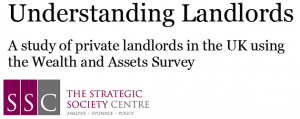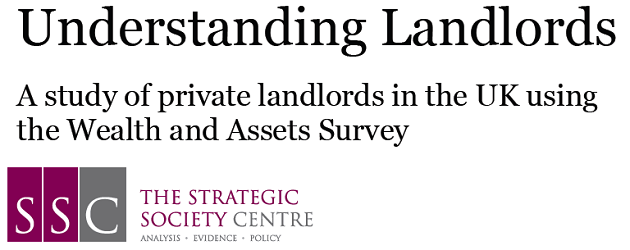The Strategic Society Centre, a London-based public policy think-tank, has published new research and policy analysis about private landlords in the UK.
 |
| [relatedPosts title=”Related Posts”] |
|
|
The last two decades have witnessed a huge rise in the number of households living in the private rented sector in the UK. Simultaneously, the number of private landlords as a proportion of the population has more than doubled.
Previously, very little has been known about who private landlords in the UK are. To address this gap in evidence, the Strategic Society Centre designed and published detailed quantitative research on this topic in collaboration with NatCen:
- Understanding Landlords – A study of private landlords in the UK using the Wealth and Assets Survey (PDF), Authors: Chris Lord, James Lloyd and Matt Barnes
The report provides detailed evidence on the demographic, socio-economic, financial and rental characteristics of private landlords in the UK, and compares landlords to other homeowners, private tenants and the general population. The report’s key findings include:
- Average age of private landlords is 48, but average age of renters is 32.
- Mean financial wealth of private landlords is £75,103, and the median is £20,500, compared to £9,506 and £398 among tenants.
- Landlords are significantly more likely to have grown up in owner-occupied housing than other groups.
Alongside the research, the Centre has published a discussion paper, which considers the policy implications of the research for public policy on pensions, housing, public spending and social mobility:
- Whose Home – Understanding landlords and their effect on public policy (PDF), Author: James Lloyd, Strategic Society Centre
Policy recommendations include a ‘new-build buy-to-let mortgage moratorium’ to limit the purchase of new-build homes with buy-to-let mortgages, in order to improve access to home-ownership among first-time buyers.
About The Strategic Society Centre
The Strategic Society Centre is a London-based public policy think-tank, founded in 2010.
The Centre has a simple mission: to examine the big, strategic challenges facing policymakers and society. These are the problems that are the most complex for government to solve, which cut across distinct policy domains and require multiple different types of strategic intervention.
Their work is independent, objective and free of partisan association.





